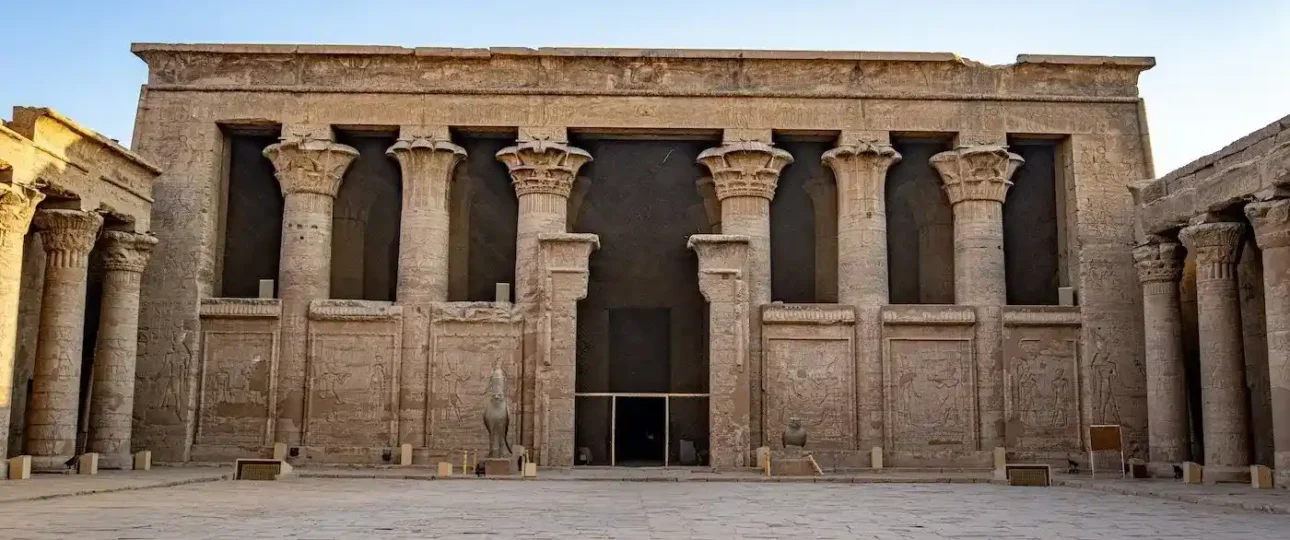History of Edfu Temple That Will Leave You Speechless
Introduction
Standing resplendent on the west bank of the Nile River, the Edfu Temple is a captivating testament to the magnificence of ancient Egyptian architecture and religious devotion—often explored as part of a scenic Nile cruise between Luxor and Aswan. Dedicated to the falcon-headed god Horus, the temple is one of the most well-preserved and impressive structures from ancient Egypt. In this article, we embark on a journey to explore the wonders of the Edfu Temple, delving into its historical context, architectural marvels, religious significance, and the enduring allure that continues to captivate travelers and history enthusiasts from around the world.
Historical Context of the Edfu Temple The Edfu Temple, known as “Temple of Horus,” was constructed during the Ptolemaic period, around 237 to 57 BC. However, the temple’s foundations date back to the New Kingdom, with the first structure dedicated to Horus built during the reign of Pharaoh Thutmose III.
The Cult of Horus
Horus, the falcon-headed god, was one of the most revered deities in ancient Egyptian mythology. As the divine protector of the pharaohs and the embodiment of divine kingship, the cult of Horus held immense significance throughout Egypt’s history.
The Legacy of Horus Worship
Edfu was considered a sacred city dedicated to the worship of Horus, and the temple served as a focal point for religious activities, including grand festivals and ceremonies honoring the god.
Architectural Marvels of the Edfu Temple The Edfu Temple is renowned for its impressive architecture, meticulous detailing, and symbolic designs that reflect ancient Egyptian religious beliefs.
The Pylon: A Gateway to the Divine
The temple’s colossal entrance pylon, towering over 36 meters high, was elaborately adorned with carvings and hieroglyphs narrating tales of divine encounters and triumphs of Horus.
The Hypostyle Hall: A Forest of Columns
Beyond the pylon lies the vast Hypostyle Hall, characterized by a multitude of towering columns intricately carved with religious scenes and depictions of the pharaohs.
Religious Significance of the Edfu Temple The Edfu Temple held profound religious significance as a site of devotion and a symbol of divine kingship and cosmic order.
The Divine Marriage of Horus and Hathor
One of the temple’s central religious rituals was the annual “Feast of the Beautiful Meeting,” reenacting the divine marriage between Horus and the goddess Hathor, representing the union of the earthly and celestial realms.
Rituals and Offerings
The priests of Edfu Temple performed elaborate rituals and made offerings to Horus, seeking his protection, guidance, and blessings for the kingdom and its people. The Edfu Temple: Rediscovery and Preservation Over the centuries, the Edfu Temple faced deterioration and burial under sand, until its rediscovery in the 19th century by French Egyptologist Auguste Mariette. Since then, efforts have been made to preserve and restore this architectural masterpiece.
Conservation and Restoration
The Egyptian authorities, in collaboration with international organizations, have undertaken extensive conservation and restoration projects to safeguard the temple’s structural integrity and artistic beauty.
Tourism and Cultural Heritage
Today, the Edfu Temple serves as a prominent cultural and historical attraction, drawing tourists and researchers alike to marvel at its grandeur—especially those enjoying a Nile cruise, where visits to Edfu are often a highlight of the journey
Conclusion
The Edfu Temple, dedicated to the mighty falcon god Horus, stands as a timeless symbol of ancient Egyptian religious devotion and architectural brilliance. As we explore its monumental pylon, intricate halls, and sacred sanctuaries, we are transported back in time, witnessing the profound significance of the temple in ancient Egyptian society.
NileTravel Machine invites you to embark on this captivating journey to the Edfu Temple, where history and spirituality intertwine, inviting us to uncover the mysteries of Egypt’s past and embrace the enduring allure of one of humanity’s most extraordinary ancient wonders.
If you’re eager to uncover more hidden gems of ancient Egypt, don’t miss our article on surprising facts about Habu Temple in Egyp

